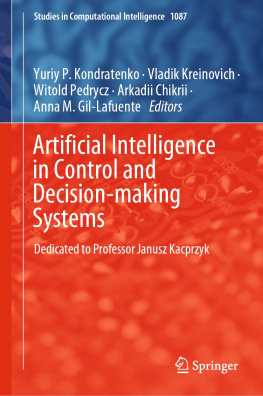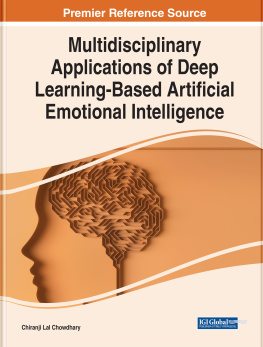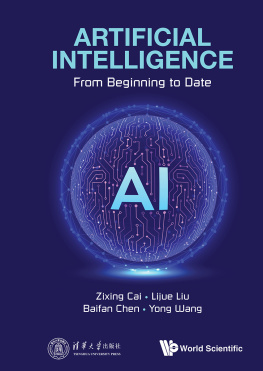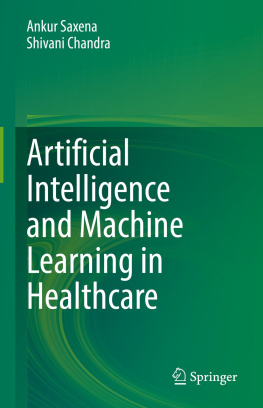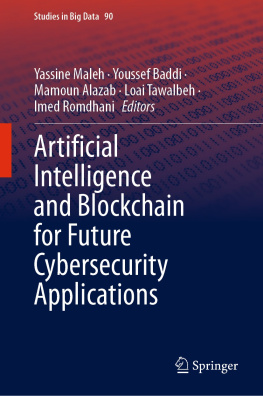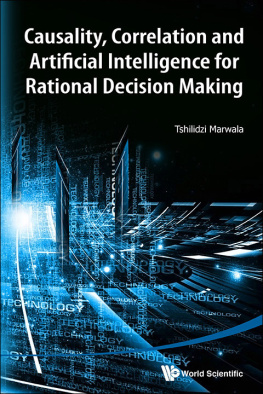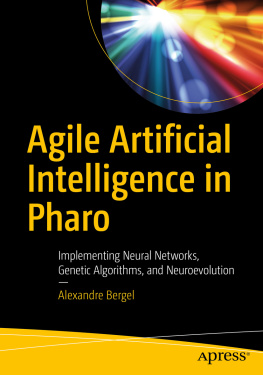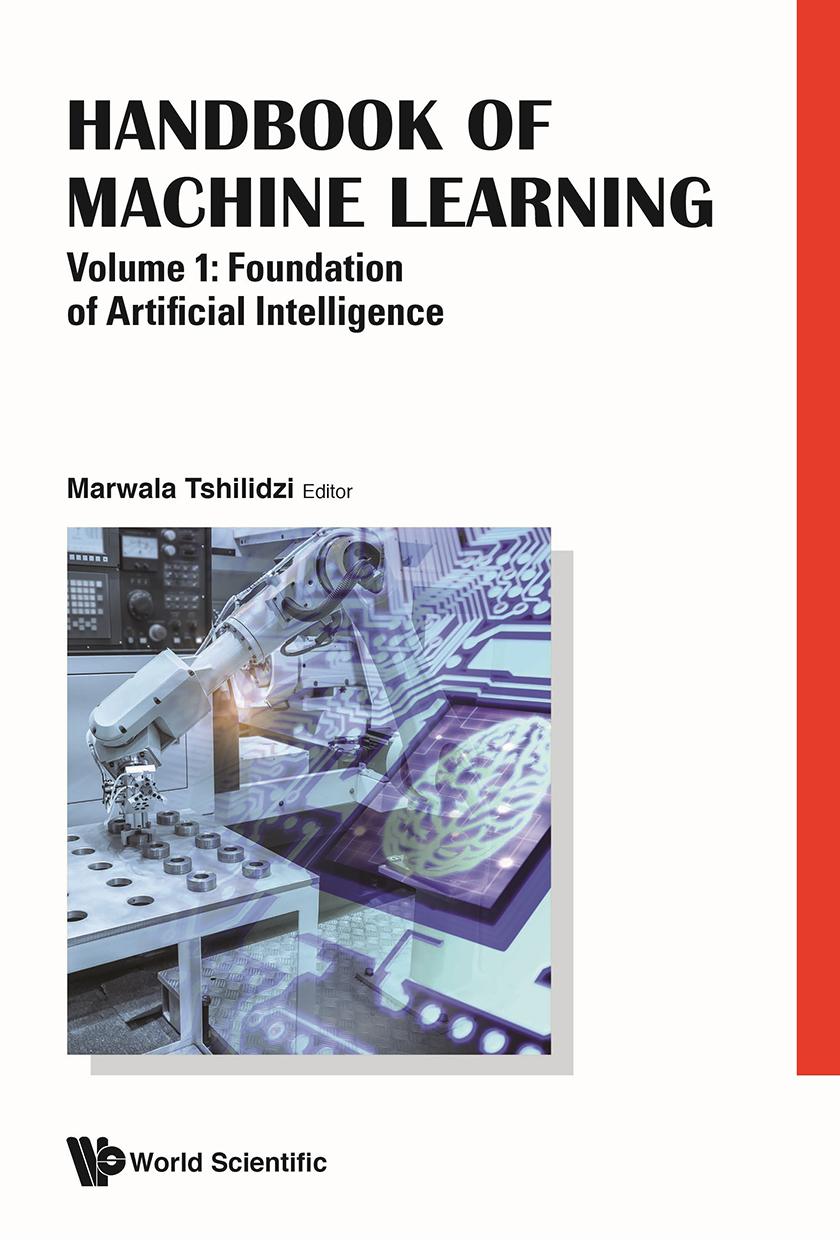Contents
Pagebreaks of the print version
HANDBOOK OF MACHINE LEARNING
Volume 1: Foundation of Artificial Intelligence
HANDBOOK OF MACHINE LEARNING
Volume 1: Foundation of Artificial Intelligence
Tshilidzi Marwala
University of Johannesburg, South Africa

Published by
World Scientific Publishing Co. Pte. Ltd.
5 Toh Tuck Link, Singapore 596224
USA office: 27 Warren Street, Suite 401-402, Hackensack, NJ 07601
UK office: 57 Shelton Street, Covent Garden, London WC2H 9HE
Library of Congress Cataloging-in-Publication Data
Names: Marwala, Tshilidzi, 1971 author.
Title: Handbook of machine learning / by Tshilidzi Marwala (University of Johannesburg, South Africa).
Description: New Jersey : World Scientific, 2018- | Includes bibliographical references
and index. Contents: volume 1. Foundation of artificial intelligence
Identifiers: LCCN 2018023989 | ISBN 9789813271227 (hc : alk. paper : v. 1)
Subjects: LCSH: Machine learning. | Artificial intelligence.
Classification: LCC Q325.5 .M3688 2018 | DDC 006.3/1--dc23
LC record available at https://lccn.loc.gov/2018023989
British Library Cataloguing-in-Publication Data
A catalogue record for this book is available from the British Library.
Copyright 2019 by World Scientific Publishing Co. Pte. Ltd.
All rights reserved. This book, or parts thereof, may not be reproduced in any form or by any means, electronic or mechanical, including photocopying, recording or any information storage and retrieval system now known or to be invented, without written permission from the publisher.
For photocopying of material in this volume, please pay a copying fee through the Copyright Clearance Center, Inc., 222 Rosewood Drive, Danvers, MA 01923, USA. In this case permission to photocopy is not required from the publisher.
For any available supplementary material, please visit
https://www.worldscientific.com/worldscibooks/10.1142/11013#t=suppl
Desk Editors: Herbert Moses/Yu Shan Tay
Typeset by Stallion Press
Email:
Printed in Singapore
Contents
Preface
Handbook of Machine Learning: Foundation of Artificial IntelligenceVol. 1 is the first of two volumes. It discusses concepts and applications of artificial intelligence. The artificial intelligence techniques that are studied include multi-layer networks, radial basis function, automatic relevance determination, Bayesian networks, support vector machines, fuzzy logic, rough sets, Gaussian mixture model, hidden Markov models, incremental learning, auto-associative network and hybrid systems. In addition, this book explores signal processing techniques, and these are the time domain, timefrequency domain and fractals approaches. This book also studies the difficult problem of causality.
These techniques are used to solve interesting problems such as modelling inflation, condition monitoring, speaker recognition, modelling interstate conflict, wine recognition, optimal character recognition, finance, artificial beer taster and modelling HIV.
This book is an interesting reference for graduate students, researchers and artificial intelligence practitioners.
Tshilidzi Marwala, PhD
March 2018
University of Johannesburg
About the Author

Tshilidzi Marwala is the Vice-Chancellor and Principal of the University of Johannesburg from 1st January 2018. From 2013 to 2017, he was the Deputy Vice-Chancellor for Research and Internationalization, and from 2009 to 2013 he was the Executive Dean of the Faculty of Engineering and the Built Environment, both at the University of Johannesburg. From 2003 to 2008, he progressively held the positions of Associate Professor, full Professor, the Carl and Emily Fuchs Chair of Systems and Control Engineering, as well as the SARChI Chair of Systems Engineering at the Department of Electrical and Information Engineering at the University of the Witwatersrand. From 2001 to 2003, he was the Executive Assistant to the technical director at South African Breweries. From 2000 to 2001 he was a post-doctoral research associate at Imperial College (then University of London). He received a Bachelor of Science in Mechanical Engineering (magna cum laude) from Case Western Reserve University (USA) in 1995, a Master of Mechanical Engineering from the University of Pretoria in 1997 and a PhD specializing in Artificial Intelligence and Engineering from the University of Cambridge in 2000. Marwala completed the Advanced Management Program (AMP) at Columbia University Businesses School in 2017 and completed a Program for Leadership Development (PLD) at Harvard Business School in 2007. Tshilidzi is a registered Professional Engineer, a Fellow of TWAS (The World Academy of Sciences), the Academy of Science of South Africa, the African Academy of Sciences and the South African Academy of Engineering. He is a Senior Member of the IEEE (Institute of Electrical and Electronics Engineering) and a distinguished member of the ACM (Association for Computing Machinery). His research interests are multi-disciplinary and include the Theory and Application of Artificial Intelligence to Engineering, Computer Science, Finance, Social Science and Medicine. He has an extensive track record in human capacity development having supervised 47 Masters and 28 Doctoral students to completion. Some of these students have proceeded with their doctoral and post-doctoral studies at leading universities such as Harvard, Oxford, Cambridge, British Columbia, Rutgers, Purdue, Chiba and Waseda. He has published 13 books in artificial intelligence, one of which has been translated into Chinese, over 300 papers in journals, proceedings, book chapters and magazines and holds four patents. He is an Associate Editor of the International Journal of Systems Science (Taylor and Francis Publishers). He has been a Visiting Scholar at Harvard University, University of California at Berkeley, Wolfson College of the University of Cambridge and Nanjing Tech University as well as a Member of the Programming Council of the Faculty of Electrical Engineering at the Silesian University of Technology in Poland. He has received more than 45 awards including the Order of Mapungubwe and was a delegate to the 1989 London International Youth Science Fortnight (LIYSF) when he was in high school. His writings and opinions have appeared in the magazines: New Scientist, The Economist and Time Magazine.
Acknowledgements
I would like to thank the following former and current graduate students for their contribution to this manuscript: Michael Pires, Msizi Khoza, Ishmael Sibusiso Msiza, Nadim Mohamed, Lindokuhle Mpanza, Unathi Mahola, Dr. Brain Leke, Dr. Sizwe Dhlamini, Geg Hulley, Dr. Collins Leke, Thando Tettey, Bodie Crossingham, Professor Fulufhelo Nelwamondo, Dr. Vukosi Marivate, Dr. Shakir Mohamed, Dr. Bo Xing, Dr. David Starfield, Dr. Pretesh Patel, Dr. George Anderson, Dr. Mlungisi Duma, Dr. Dalton Lunga, Dr. Linda Mthembu, Dr. Craig Boesack, Dr. Bolanle Abe, Dr. Evan Hurwitz, Dr. Linda Mthembu, Dr. Marcos Alvares, Dr. Pramod Parida, Dr. Ali Hasan, Dr. Ilyes Boulkaibet, Dr. Satyakama Paul, Dr. Meir Perez, Dr. Megan Russell and Dr. Busisiwe Vilakazi.


